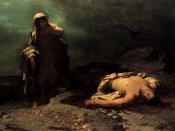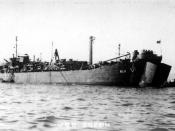A master artisan and innovator of the Greek tragedy, Sophocles's insightful plays have
held their value throughout countless time periods and societies. Through the use of common
literary techniques, Sophocles was able to express themes and ideas that reflect all of
humankind. On particular idea was that Sophocles believed that hubris is destructive and will
eventually lead to one's demise.
Creon, the proud king of Thebes has such a fatal flaw. His hubris alienates Teiresias,
Haimon, and his people. Teiresias attempts to explain to Creon the severity of Creon's
actions, but Creon only shuns Teiresias. No matter how potent the signs, Creon 'would not
yield,' (Scene 5, Line 47). Creon's hubris prevents him from recognizing his self-destructive
behavior. Instead, he accuses Teiresias of disloyalty and succumbing to bribery. He feels
Teiresias has 'sold out' (Scene 5, Line 65) and that Creon was 'the butt for the dull arrows
of doddering fortunetellers' (Scene 5, Line 42).
Such inventions of Creon prove to be both
counter-productive and foolish, for Teiresias did speak the truth and Creon is only further
drawn into his false reality dictated by hubris.
Creon's fatal flaw overcomes him in a discussion with his son. Haimon confronts his
father about Creon's reckless and unreasonable actions dealing with Antigone. His hubris
transcends his better judgement and causes Creon to become defensive. Creon then ignores his
son's recommendations on the basis of age and seniority as follows: 'You consider it right for
a man of my years and experience to go to a school a boy?' (Scene 3, Line 95). His anger
intensifies until he explodes at his son, 'Fool, adolescent fool!' (Scene 3, Line 114). At
that point, Creon was far too immersed in his own foolish pride to recognize his perverseness.
His hubris had reduced him...


